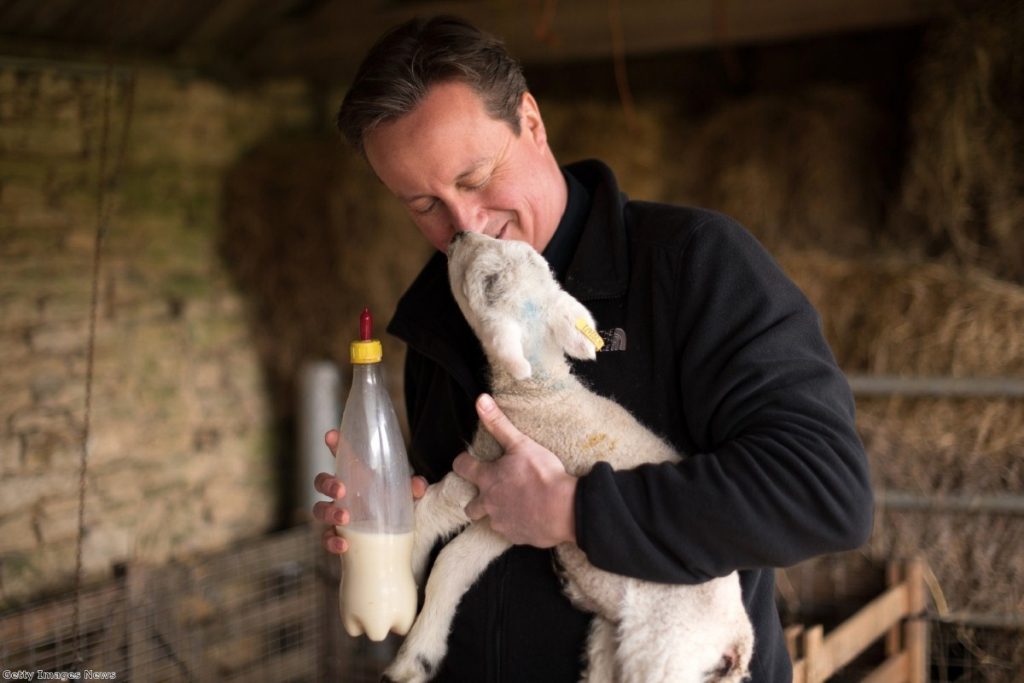This isn’t an election, it’s an extended photo-op
The general election has been stage-managed into oblivion. On May 7th British voters will make one of the most momentous choices for a generation. Electing a Conservative government, for instance, would lead to scrapping the Human Rights Act, holding a referendum on Europe and slashing public services to their bare minimum. Whatever your view on any of these matters, there is real distance between the two political parties and real consequences to the vote.
So where is the politics? Where's the content? It has been replaced by photo-ops. Cameron is reading to children in a school. Nick Clegg is on a zip-wire. Ed Miliband is out with the kids. Nigel Farage is on a boat with Joey Essex. Behind the relentlessly happy photos of politicians is a harsh security cordon and a careful vetting of who can attend. Whatever happens, they must not be asked any tough questions.
This is a deliberate process designed to strip the election of democratic scrutiny. Forget the leaders' debate – most political leaders, including Miliband, refuse to get involved in any serious interview. Cameron will chat about Game of Thrones and Miliband will chat about his video game record, but where are the searching inquiries you might expect at election time? Nowhere to be seen. From the lowliest blogger to the highest broadcast journalist – party leaders are turning down interview after interview. In such a tight election, they are considered a risk and nothing more.


Political parties have scrapped the morning press conferences they would hold in past elections, where journalists would be given the chance to ask them questions. They say Twitter has made them irrelevant. It's nonsense. Twitter has done nothing of the sort. The press conferences were an opportunity to ask potentially damaging questions of senior figures in the party, so they've had to go.
Most speeches and announcements are now done with the leader flanked by party activists in locations far outside of London. Advance notices of these events to the press are starting to dwindle. Increasingly, only sympathetic newspapers are able to attend.
It's as if all the parties have taken a note out of Ukip's book. Ukip acts like a rebellious anti-establishment party but in fact it is one of the most censorious and controlling of all of them. Months ago, Ukip spokesman Patrick O'Flynn – formerly of the Daily Express – starting excluding digital journalists from press conference. It was an unheard of development. Now, everyone is excluded. The account of Farage's much-photographed fishing trip yesterday in the Guardian observes that all questions were pre-vetted. Even Ukip members struggle to ask Farage questions – only party workers are really trusted.
Where politics does take place it is pointless and without substance. Michael Fallon's Trident intervention today is based on nothing. There's no point saying Miliband will cancel Trident. He won't. Labour and the Tories have enough votes between them to get Trident through no matter the election result. The intervention is designed solely to make Labour uncomfortable and deliver Lynton Crosby's thin-end-of-the-wedge message of fear to marginal English voters. There is nothing behind it. It does not relate to a real thing. It is political mist. His approach to the issue – a half-deranged attack on Miliband as someone who'll stab Britain "in the back" as he did his brother – is designed to steal attention away from the Labour leader's non-dom announcement, which, to his credit, was the one moment of substance in the campaign so far.
Everything has been done to prevent scrutiny. Journalists have been excluded, leaders have been shielded from questions, events have been reduced to heavily-managed photo opportunities, and political comments are, as far as possible, purposefully without substance. They have stripped politics out the election.
Those images of leaders doing adventure activities or playing with farm animals are meant to be reassuring but they are the precise opposite. They're a lie.
On May 8th, once the unseemly business of public support is done with, Clegg will no longer be riding ziplines. Cameron won't be reading primary school playbooks and Miliband won't be taking days out in the working week with his family. Nigel Farage, it must be admitted, probably will be down the pub, but he's the exception that proves the rule.
These men will be doing politics. The only time they stop doing politics is when the public are involved. Then it suddenly becomes dangerous and must be replaced with pictures of a farm.

